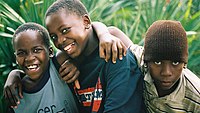
Photo from wikipedia
This paper discusses the research feasibility of Annual Status of Education Report (ASER), volunteering citizen-led social survey conducted in Pakistan. The paper presents a detailed commentary on the process of… Click to show full abstract
This paper discusses the research feasibility of Annual Status of Education Report (ASER), volunteering citizen-led social survey conducted in Pakistan. The paper presents a detailed commentary on the process of ASER data collection, discussing the strengths, limitations and quality of the data maintained. There are also findings of the ASER data analysis from 2013 to 2016 with a focus on 34 risk factors associated with children’s cognitive ability at age 8 (N=89,460).The results show that ‘not enrolled in school’ and ‘household poverty’ are the biggest risk factors for children to achieve an expected level in learning. However, school type attended by children does not explain variation in the learning outcomes. Children missing information on household characteristics are at high risk of failing to achieve. Social surveys are feasible for understanding the patterns of household poverty and access to education. Following the discussion on results, the paper considers policy implications of maintaining a national database of all children, ensuring a universal access to school education in Pakistan.
Journal Title: Journal of International Development
Year Published: 2019
Link to full text (if available)
Share on Social Media: Sign Up to like & get
recommendations!